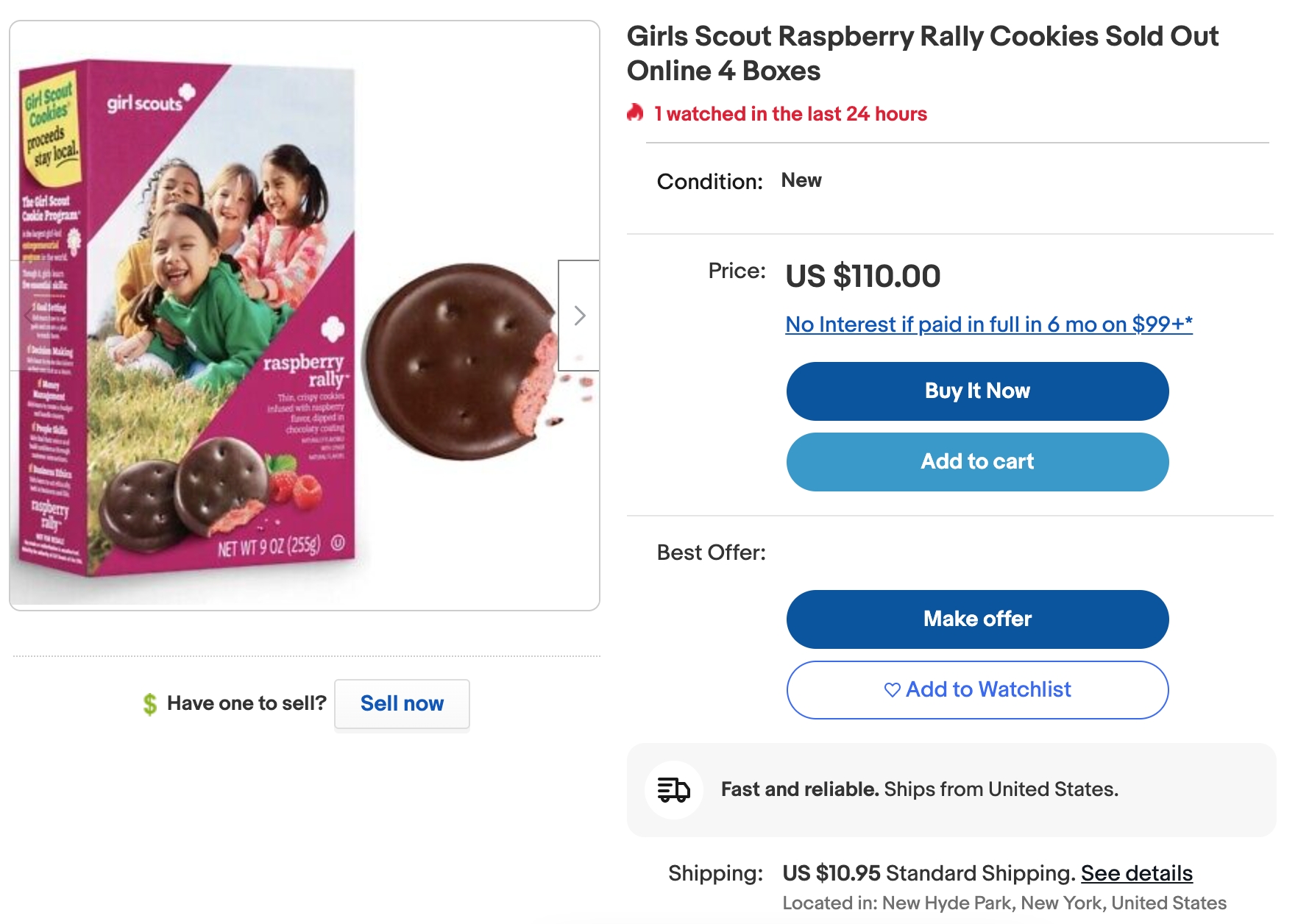While trying to pass enthusiastic little girl scout cookie vendors with your head down, more often than not, social pressure combined with a sweet “hello!” will only lead to one result — extraction of funds. And at the end of the day, their cookies are so damn tasty, how can you resist? Besides teaching girls essential face to face business strategies, the Girl Scout program also aspires to keep Scouts up with the times.
This desire for cookie innovation prompted the creation of a new sister thin-mint product with raspberry filling, Raspberry Rally, an exclusive online cookie that can only be purchased online and shipped directly to consumers.

While the intention was to help girls develop e-commerce skills, they unknowingly produced a 101 crash course in the cruelty of e-commerce. First priced at $6, the cookie was a hit and sold out instantly. Wholesale scalpers are now dealing this rare product on eBay like black market moonshine in the 1920s. Third-party vendors are making profits (from $30-$100) off the Girl Scout name, and HQ is not happy.

A Girl Scouts spokesperson told CNN, “When cookies are purchased through a third-party seller, Girl Scout troops are deprived of proceeds that fund critical programming throughout the year.”
That’s not technically true. If all the Raspberry Rally inventory was bought out, how does that deprive proceeds? Doesn’t that mean they made the most money possible? On the surface, yes, and legally speaking, this doesn’t hurt the Girl Scouts. In fact, eBay doesn’t plan on taking the product off their website, stating to CNN, “We strongly support the entrepreneurial spirit of hardworking local Girl Scout troops and encourage cookie-seekers to also support their local Girl Scouts. However, the sale of Girl Scout cookies does not violate eBay policies.”
Despite being technically legal, this hurts the Scouts for a few reasons. First, it attacks the integrity of the brand. In an article from Today.com, a Girl Scout Spokesperson mentioned, “Girl Scouts of the USA and our licensed cookie bakers cannot guarantee the freshness or integrity of cookies bought through unauthorized sites.” Third-party sellers might offer cookies that not only tarnish the quality of the product, but also the message behind it.



Additionally, the Scout PR team reasoned,”If you’re buying these cookies at a huge markup, you could and should instead be using that money to support girls by buying other varieties or supporting the program in other ways.” It’s a good point, if you’re willing to spend that much on a cookie, it might as well go to an organization that promotes goal setting, people skills, business ethics, and making lifelong friends. Sadly, this whole fiasco might demonstrate that some people care more about the cookie than the message behind it.
Ultimately, this can and should be a learning experience for not just individual Girl Scouts, but the organization as a whole. For one, it illustrates the nature of E-commerce; how products can be acquired at a lower price and then sold higher. Remember, this all happened because of scarcity and a huge demand for this new cookie. These girls can reason “perhaps we should sell more and maybe even raise the price.” For the organization, it could try fixing its scalper problem by putting a limit on the amount a single customer can purchase. This would prevent “re-sellers” from acquiring all the cookies in bulk.
Despite the concerns of The Girl Scouts, the fact remains that people are obsessed with their cookies. With that knowledge and the lessons learned from this first attempt at an online exclusive product, expect the Scouts to rally back more business savvy in the online space.
If you want Girl Scouts cookies but still desire to keep your head down, consider buying them online from the Scouts themselves.







